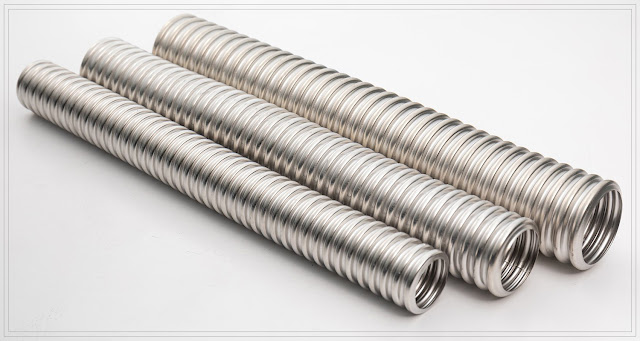Usually, bolts produced in grade 10.9 are tempered and quenched. Because carbon steel has been tempered and quenched, the resultant high strength bolts grade 10.9, becomes harder and tougher. Ordinarily, welding carbon steel is difficult on account of the presence of higher carbon content. But when the alloy undergoes tempering and quenching, the alloy becomes very weldable. Stainless steels usually have a considerably lower content of carbon in their alloy, which makes them easily weldable. However, stainless steels are modified, in particular those belonging to the austenitic classes, simply by lowering the content of carbon to increase their weldability. Carbon steels tend to get affected in the HAZ or heat affected zone during welding due to their high levels of carbon. Because stainless steel is modified, the risk of weld areas undergoing sensitization is low. This means that carbon steels are more susceptible to intergranular corrosion as compared to several stainless steel alloys. Speaking of the corrosion resistance properties, while carbon steels are hard, their resistance to corrosion is almost little to none, unlike stainless steel hex head bolts, which depending on their grade tend to range between good to outstanding.
Application of Grade 10.9 Fasteners
- HT Studs uses in Petrochemicals
- Grade 10.9 Nuts uses in Specialty Chemicals
- Grade 10.9 Bolts And Nuts uses in Pharmaceuticals
- HT U Bolts uses in Spiral Welded tube for burner pipes and flues
- Grade 10.9 Fasteners uses in Gas Processing
- HT Fasteners uses in Power Generation
- Grade 10.9 Threaded Rod uses in Sea Water Equipment
- HT Bolts uses in Off-Shore Oil Drilling Companies
- HT Anchor Bolts uses in Heat Exchangers
- HT Fasteners uses in Pharmaceutical Equipment
- Grade 10.9 Steel Fasteners uses in Aircraft Exhaust Manifolds
Typical Uses Of Grade 10.9 Fasteners
- Metric Grade 10.9 Hex Bolts for Power Generation
- Offshore & Chemical Industry
- Electrical & Agriculture Industry
- Engineering & Aerospace Industry
- Heavy duty Grade 10.9 Fasteners for Heat Exchangers
- High quality Grade 10.9 Petrochemical Fasteners
- High Strength Grade 10.9 Bolts and Nuts for Automotive industry
- Large size Grade 10.9 Bolts for Oil & Gas Industries
- Grade 10.9 Stud Bolt for Construction
- Grade 10.9 Nut Bolt suitable for Off-Shore Oil Drilling
Grade 10.9 Bolts Testing Tool & Equipment
- Micrometer for accurate measurement of Grade 10.9 Bolt
- Coordinate Measuring Machine
- Thread gauge and Smooth plug gauge used to check Grade 10.9 fasteners quickly
- Image measuring instrument
- Routine inspection of calipers
- Roughness tester used to test the surface finish of a Grade 10.9 Bolts and Nuts
Difference Between Grade 10.9 Bolts Vs Stainless Steel Bolts?
Since stainless steels are alloyed with elements such as molybdenum, chromium, nickel, manganese, silicon, phosphorus, sulfur, copper, tungsten, nitrogen, etc, their properties see an increase, be it their mechanical properties or resistance to corrosion. The preference for high tensile bolts 10.9 grade is due to the good economical advantage they offer in comparison to the conventional stainless steel such as grade 304 or 316. In instances that demand higher resistance to corrosion, in the form of oxidation, or even pitting, using stainless steel bolts is considered to be a much safer bet. Though the rate of stainless steels is higher, they make up for it by their amazing corrosion resistance properties, while also exhibiting superior mechanical properties at elevated temperatures. Because stainless steels are ductile, they deform. This is an advantage in environments that involve high pressure. Unlike carbon steels, which would break due to them being brittle, the ductility of stainless steel hex bolts, permits them to stretch and expand, thereby accommodating the high pressure needs of the application. Some types of Stainless steel bolts are able to resist corrosion by salt solutions, brine, and seawater, making them ideal for marine engineering applications.
What is Stainless Steel Bolts?
Stainless Steel Bolts with higher amounts of chromium and nickel as compared to other grades are referred as austenitic stainless steel. This steel is generally non-magnetic in nature. Austenitic steels have high corrosion resistance and cannot be hardened by heat treatment. The tensile strength of these Stainless Steel Bolts range from 75000 to 105000 psi in as rolled condition.
Why choose stainless steel Bolts?
Why choose stainless steel Bolts as opposed to the other options at your disposal? Stainless steel has become the first choice for most professional and DIY jobs, but why is this? Here are four reasons why stainless steel Bolts should be the only ones you use.
Durability
Stainless steel is incredibly strong, which means it lasts longer than any alternatives. What’s more, this durability is less dependent on the environment than would be the case with other materials. Even in harsh or damp environments, stainless steel Bolts hold their own.
Resistance to corrosion
Stainless steel is highly resistant to corrosion. In situations where they are exposed to moisture or some other, possibly even more corrosive substance, stainless steel Bolts will either show no signs of corrosion at all, or will corrode so slowly as not to present a problem. This depends on the particular mix of alloys in the steel, as well as the harshness of the conditions.
Low maintenance
Due to their toughness and durability, stainless steel Bolts won’t require much maintenance. They won’t pick up scratches and marks as easily as other Bolts, and will seldom, if ever, need replacing.
Value for money
Thanks to all of the above benefits, stainless steel Bolts, although more expensive than alternative screws and bolts, offer high value for money. Because you will need to replace them far less often than competing products, you get greater long-term value when you choose stainless steel.
Stainless steel is great for almost all jobs and conditions. If you are looking for the best quality stainless steel Bolts in India, contact Philips Metal. We have the right stainless steel Bolts to suit any job.




Comments
Post a Comment